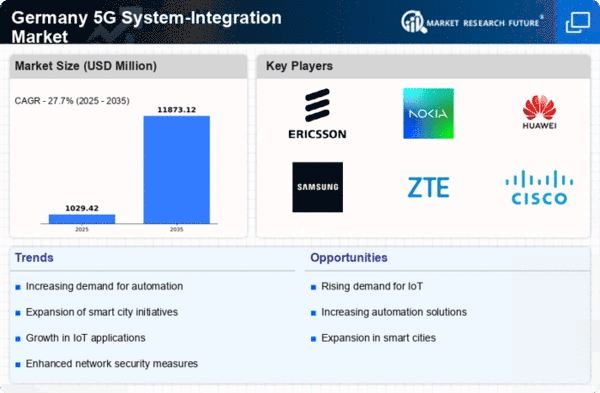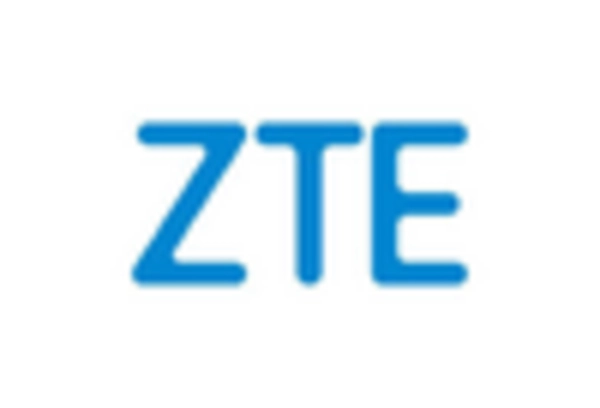Emergence of Industry 4.0
The emergence of Industry 4.0 in Germany is reshaping the landscape of the 5g system-integration market. As manufacturing processes become increasingly automated and interconnected, the demand for reliable and fast communication networks intensifies. 5G technology is pivotal in enabling real-time data exchange and remote monitoring, which are essential for smart factories. The German manufacturing sector is projected to invest over €10 billion in digital transformation initiatives by 2025, highlighting the potential for 5G integration. This shift towards automation and digitalization suggests that the 5g system-integration market will experience robust growth as industries seek to adopt advanced technologies that enhance operational efficiency.
Government Initiatives and Support
Government initiatives play a crucial role in shaping the 5g system-integration market in Germany. The German government has committed to investing €2 billion in 5G infrastructure development, aiming to enhance digital connectivity across the nation. This funding is directed towards improving network coverage in rural areas, thereby bridging the digital divide. Additionally, regulatory frameworks are being established to facilitate the deployment of 5G technologies, which encourages private sector participation. The government's proactive stance not only fosters innovation but also attracts foreign investments, further stimulating the market. As a result, the 5g system-integration market is likely to benefit from these supportive measures, leading to accelerated deployment and integration of 5G systems across various sectors.
Increased Adoption of Cloud Services
The rising adoption of cloud services in Germany is a significant driver for the 5g system-integration market. As businesses transition to cloud-based solutions, the need for high-speed, low-latency networks becomes paramount. The integration of 5G technology with cloud services allows for enhanced data processing capabilities and improved user experiences. Recent studies suggest that the cloud computing market in Germany is expected to grow by 25% annually, reaching €30 billion by 2026. This growth is likely to spur demand for 5G system integration, as organizations seek to leverage the benefits of both technologies. Consequently, the synergy between cloud services and 5G integration is anticipated to propel market expansion.
Rising Demand for High-Speed Connectivity
The increasing demand for high-speed connectivity in Germany is a primary driver for the 5g system-integration market. As businesses and consumers alike seek faster internet speeds, the need for robust 5G infrastructure becomes evident. According to recent data, approximately 80% of German households are expected to have access to 5G networks by 2026. This surge in demand compels telecom operators and system integrators to invest in advanced technologies and solutions that facilitate seamless integration of 5G systems. Furthermore, the proliferation of IoT devices, which are projected to reach over 1 billion units in Germany by 2025, necessitates a reliable and high-speed network. Consequently, the 5g system-integration market is poised for substantial growth as stakeholders strive to meet these connectivity demands.
Growth of Smart Cities and Urban Development
The growth of smart cities in Germany is significantly influencing the 5g system-integration market. Urban areas are increasingly adopting smart technologies to enhance efficiency and sustainability. For instance, cities like Berlin and Munich are implementing smart traffic management systems that rely on real-time data and high-speed connectivity. The integration of 5G technology is essential for these applications, as it enables faster data transmission and improved communication between devices. According to estimates, the smart city market in Germany is projected to reach €100 billion by 2025, creating substantial opportunities for system integrators. This trend indicates a strong correlation between urban development initiatives and the demand for advanced 5G integration solutions.
















